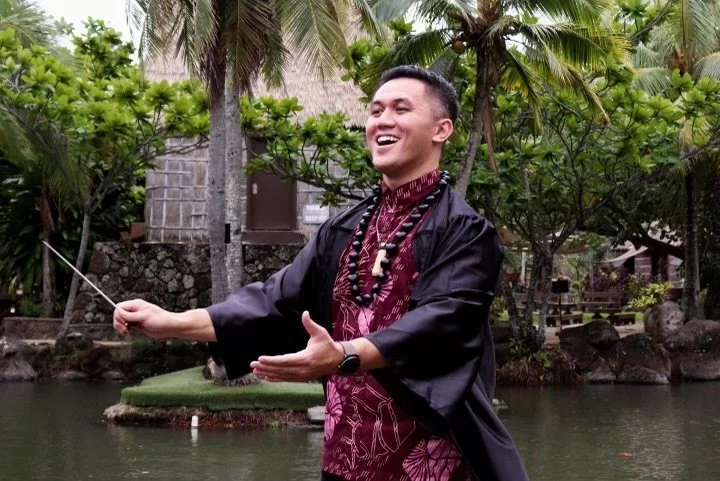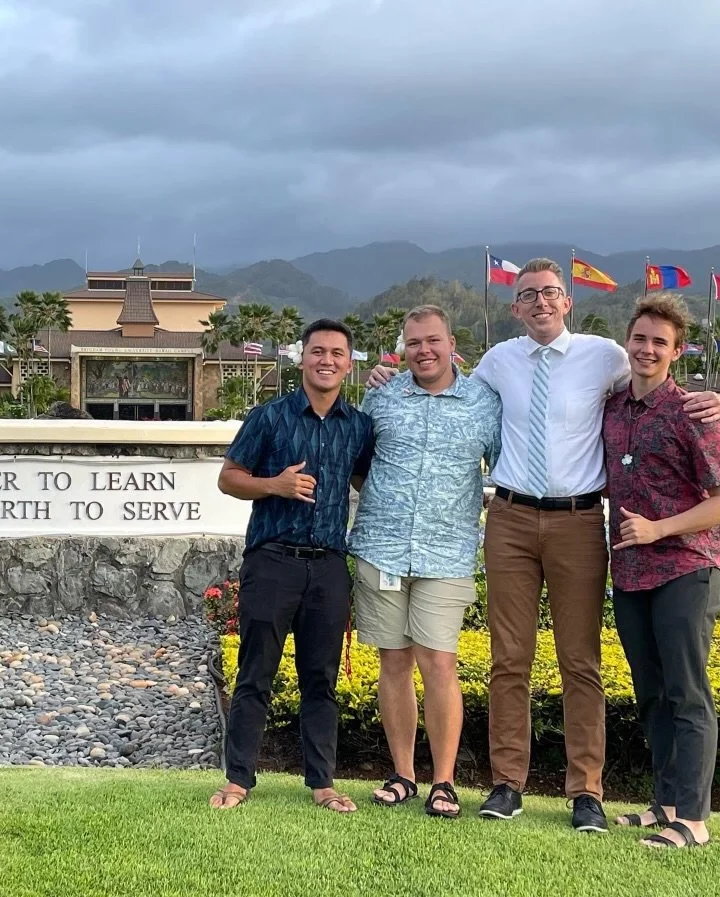After earning two degrees in music performance, Iese Wilson, 30, now holds his dream job as a high school choir director. The conductor role he’s assumed in advocacy work has also proven a dream come true for many of his LGBTQ+ Latter-day Saint peers around the world who have benefitted from his efforts.
But it first took Iese (pronounced eeYESeh) years of coming to terms with his own identity as a gay believer in his faith, which ultimately happened in a prayer in which Iese was told he was to come out to his family and to also help take care of the LGBTQ+ population at BYU Hawaii, where he was a student. At first, he argued with God, feeling this went against everything he’d been taught. But when Iese pulled out his patriarchal blessing “to prove God wrong,” he read words in a new light that confirmed his life mission would include full-time ministry work in this space.
It all started with a church talk he gave at BYU Hawaii in 2019, when he was 25 years old. While speaking about faith, Iese felt prompted to come out to his ward. Some students approached him afterwards about starting a support group, which led to him helping create the first LGBTQ+ support group for members off campus. Iese anticipated he might be bullied for these efforts, but that didn’t happen. Instead, he had people coming to him left and right, eager to confide and share the isolation they’d experienced, with desires to build community. “It was mind-blowing how many there were who needed to connect. I realized I had to do something about this.”
Over a couple years, Iese says an estimated 200 people reached out to him for support from across campus and from around the world via social media, including those hailing from the Phillipines, Samoa, Fiji, Taiwan, Japan, Tonga, areas of southeast Asia as well as those in the United States. Often, Iese would agree to meet with the students in secure locations, as so many of them were experiencing intense fear under Honor Code policies. Iese organized these stories and compiled a summary of the experiences of 36 students (while protecting their identity), and shared the document with BYU Hawaii’s President, John Kauwe III. He was blown away by the university’s president support and desire to learn more. A globally renowne researcher on Alzheimer’s disease as well as a recently called Area Seventy, President Kauwe was someone Iese found highly impressive. Iese was further impressed as President Kauwe looped university VP Jonathan Kau into the conversation. Together, along with the support of Iese’s uncle and stake president Kinglsey Ah You, Iese was invited to organize the university’s first LGBTQ+-themed fireside.
Having seen their video about being supportive parents of a gay son (and BYUH alum) named Xian on the LDS church website, Iese reached out to the Mackintosh family of Utah to see if they might be willing to zoom in to speak at the fireside. They happily obliged. In the days leading up to the event, Iese was also asked to sit on the panel. As he shared his desperate plea for students and faculty to consider how they could improve inclusion efforts, he looked out in awe at hundreds of students, many of whom he recognized as closeted students who never anticipated feeling this kind of support at the university. It was a powerful moment for Iese, after years of navigating powerful feelings.
Though he didn’t have words for it, Iese first knew around age 10 he was different from his peers. After attending elementary school each day in Garden Grove, CA, Iese would join about 15 cousins at his grandma’s house, where he felt like the “odd one—the loner, the reader.” He’d listen as his older cousins and kids at school talked about their crushes, and wonder why he was drawn to boys. When he attended a summer camp for Hawaiian kids right before sixth grade, he was terrified to see he’d be expected to shower in a restroom with a “tree of life showerhead situation.” He begged his counselors to not have to use the group shower, horrified of what might happen. But he didn’t have a word for it until middle school, when Iese first came across the word “gay.”
It was around this time that Prop 8 ballot measures were surging in California. While his family was less active in the church, Iese absorbed that if he were to be the “good Mormon boy” he was trying so hard to be, he needed to adopt the homophobic rhetoric he witnessed some of his peers and youth leaders vocalizing as they advocated against gay marriage. He says that, “Seeing the protests in front of our temples was an outward expression by society of what I was experiencing as a gay person in the church. Around age 13, I decided that gay people were evil.” Then, a boy named Chance transferred into his school and joined choir. Iese was a senior, and new move-in Chance was a sophomore and had “the cutest face ever.” One day, Chance opened up to Iese about what had brought him from northern to southern California. When Chance had told his parents he was gay, his father became really angry and made sure it was “a really rough evening for Chance.” After crying himself to sleep, Chance woke up the next morning to find out his father had shot and killed himself. Later, his mom relocated them to Orange County for a fresh start. Hearing this, Iese opened his eyes to the dangers of homophobic rhetoric and behaviors—that Chance trying to connect with his parents over his orientation resulted in an undeserved outcome Chance would have to live with the rest of his life. “It didn’t seem right,” says Iese. “For the first time, I started questioning that maybe being LGBTQ+ was not evil.”
Years later, the power of story was what inspired Iese to take his peers’ distressing experiences to President Kauwe. It was never his desire to tell the university president (or the church) what to do, but to provide opportunities for increased understanding--an increase he himself had worked hard to gain—while letting the leadership know he trusted their revelatory processes. After high school, Iese worked a few jobs and went to community college before being called on a mission to Auckland, New Zealand, where he was excited to learn Samoan, the language of his ancestors. But instead of studying the language for hours a day as instructed, Iese recalls spending way too many hours searching the scriptures and church manuals to figure out why he was gay and how he could change it. Believing in President Boyd K. Packer’s admonition that “studying doctrine is more likely to change behavior than studying behavior will change behavior,” Iese convinced himself he could “study the gay away.” His obsession translated into a self-righteousness perfectionism in which he says he held others to unrealistic standards. It wasn’t until the end of his time in New Zealand that he met a fellow missionary who taught him by example how to finally find peace through Christlike love. A few years after his mission, Iese moved to Hilo, Hawaii, where he met a community of similarly loving members of the church who modeled pure love and gave him the tools he needed to become a more kind, caring human. This, coupled with an understanding bishop he’d had back in California who was a father of a gay son himself and helped Iese get into therapy, allowed Iese to undergo a process of “sandpapering away the levels of my pride and self-hatred. There were some rough, gritty sections, and some fine gritty sections, but either way, it was gritty and it took years.”
Iese recognized that heretofore, he’d been operating “like Javert from Les Mis,” with a rigidity that often created friction with others, including his two younger brothers. After his mission, when he came out to his family, he apologized for this behavior, and was met with a warm reception by his family, aside from an initial response by his dad at first trying to “fix him” by asking, “Have you really thought about this?” Iese laughed and replied, “Yeah, I’ve thought about this.” Iese was deeply touched by his mom’s response. An “impeccable human” who works as a concierge nurse and personal trainer, his mother tearfully opened up the day after he came out while the two were out for a walk about how much it pained her to think she never noticed how much her oldest child was hurting. She said, “You love the church so much and now life’s going to be so much harder for you and there’s nothing I can do about it… Was I so busy that I couldn’t see my boy was hurting and he couldn’t trust me to support him?” Iese says, “Here we were, walking the dogs and crying through the neighborhood… I never guessed my mom might feel that way. I thought it might be more of a ‘You’re ruining our eternal family,’ but no. My mom’s my hero. That was an A+ response.”
The call to bear and ease the burdens of others expanded beyond Hawaii for Iese. Besides instigating the fireside, while at BYUH, he had the opportunity to be a guest on both Richard Ostler’s “Listen, Learn and Love” podcast and Ben Schilaty’s and Charlie Bird’s “Questions from the Closet” podcast. After graduating, he pursued his master’s degree at ASU where he continued his advocacy efforts and has been asked to speak at institute and various ally events. Besides leading a high school choir program, Iese is now also the choir director for the Tongan ward he attends. He loves this ward, who overwhelmed him with support and flower leis at his recent masters’ program graduation. Last fall, Iese was asked to be the opening speaker at Gather, and he is eager to continue his efforts to magnify the voices and stories of LGBTQ+ members of the church from all over the world.
Iese has also recently experienced the joy of human connection, as he is now in a seven-month relationship with his boyfriend, whose family is involved in the performing arts. Iese says he appreciates how the Greeks have different words for love, which he has now come to better understand: “There’s agape for brotherly love. In the church, Jesus speaks of the communal family model of love. There is flirtatious love, but I wanted to understand romantic love, particularly as a conductor and trained musician. Having studied music through the centuries, one of the most studied topics is love, and I would be remiss if I didn’t experience it in this life.” Iese says he had to do a little work to gain the support of his boyfriend’s Christian dad, who at first resisted meeting him. But Iese laughs, saying, “I won him over by talking football and Jesus.” His boyfriend attended an ally event that Iese was speaking at. Iese watched with joy as his typically shy boyfriend was flocked by attendees after the refreshments and ended up sharing his story with strangers. Iese thought, “Look at him go; that’s my boyfriend.” On the way home, Iese’s boyfriend said, “I didn’t know what you meant by doing advocacy work with your church, but now I see and I understand. I want to support you in this, however I can. I want to stand by you in all this.” As for their future, Iese says, “Time will tell; but for now, I’m really grateful.”


































